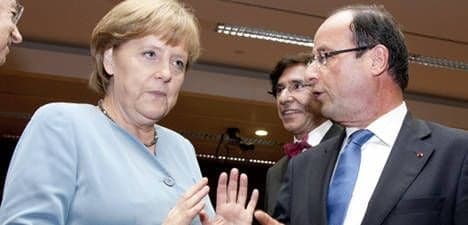Merkel and Hollande talk ahead of crunch summit

Germany's Angela Merkel held last-minute talks with French President François Hollande on Wednesday before a crucial EU summit but warned she would not budge in her opposition to pooling eurozone debt.
In brief statements before the talks here in Paris both leaders made conciliatory gestures, with Hollande indicating he was ready to discuss further integration and Merkel hailing measures to promote eurozone growth.
But there was no sign that Paris was ready to immediately accept closer European political integration and Merkel had already dismissed a key French proposal – eurobonds pooling the bloc's debt – before even arriving in Paris.
"We both want to deepen economic, monetary – and in the future political – union, to arrive at integration and solidarity," Hollande said.
He said the eurozone needed "integration as much as necessary, solidarity as much as possible."
Merkel said the two-day EU summit starting in Brussels Thursday will be "of very great importance for the future of Europe."
"Significant progress has already been made regarding the growth pact," she said, referring to a plan to invest up to 130 billion euros ($162 billion) in kickstarting eurozone economic growth.
"We need more Europe, we need a Europe that works, the markets are expecting this, and we need a Europe whose members help each other," she added.
France and others have pushed the idea of issueing debt backed by the entire eurozone as a means of tackling the crisis, but Germany insists closer political and economic integration is needed first.
"Guarantees and controls must go hand-in-hand. There can only be joint liabilities when sufficient controls have been put in place," Merkel told the German parliament.
"Apart from the fact that instruments like eurobonds, eurobills, debt redemption schemes and much more are not compatible with the constitution in Germany, I consider them wrong and counterproductive."
Merkel's Paris meeting was the latest in a rush of shuttle diplomacy to prepare for the summit in Brussels that will seek to tackle the short-term crisis and thrash out measures to prevent it occurring again.
The centrepiece of the summit is likely to be a repackaging of existing accords into the "growth pact" – hailed as amounting to one percent of European output.
But leaders will also seek to define the shape of the embattled eurozone for the next decade, seeking closer integration in the form of a banking union and handing powers to the European level for countries' financial sectors and budgets.
European leaders were handed a stark warning by crisis-hit Spain earlier Wednesday, whose prime minister, Mariano Rajoy, said his country cannot continue to finance itself at the high rates it currently pays on the markets.
"The most urgent subject is the subject of financing," Rajoy told parliament.
"We cannot finance ourselves for a long time at prices like those we are now paying," he said, as the yield on Spanish government 10-year bonds traded at more than 6.8 percent.
The warning raised the nightmare scenario that Spain, the eurozone's fourth biggest economy, might need a full-blown sovereign bailout with dire consequences for the rest of the bloc.
And Rajoy warned that the problem of higher borrowing costs, which already forced Portugal, Ireland and Greece to seek multi-billion-euro bailouts, was not limited to Spain.
"There are institutions and also financial entities that cannot access the markets. It is happening in Spain, it is happening in Italy and it is happening in other countries," he said.
As if to prove his point, Italy had to pay investors much higher rates of return at a short-term bond auction later Wednesday.
Spain's central bank also warned that the country's crippling recession was deepening.
After economic output shrank by 0.3 percent in the last quarter of 2011 and again in the first quarter of 2012, the latest data showed further contraction in the second quarter and "at a more intense pace", it said.
In one positive sign ahead of the summit, Italy's parliament approved a controversial labour market reform on Wednesday, in time for Prime Minister Mario Monti to arrive at the meeting with it in hand.
The reform, which Monti's government says is key to restarting growth in the recession-hit economy, should help reassure Monti's EU partners on Italy's commitment to reform.
The International Monetary Fund meanwhile said that Cyprus, which on Monday requested a bailout from the EU to protect its Greek-exposed banking sector, has asked it for financial aid.
"Today, the IMF received an invitation from the Cypriot authorities to participate in the external financial assistance to contain the risks to the Cypriot economy," IMF managing director Christine Lagarde said in a statement.
Eurozone finance ministers said after a conference call Wednesday that they were favourable to Cyprus's request for financial help in coordination with the IMF.
Join the conversation in our comments section below. Share your own views and experience and if you have a question or suggestion for our journalists then email us at [email protected].
Please keep comments civil, constructive and on topic – and make sure to read our terms of use before getting involved.
Please log in here to leave a comment.